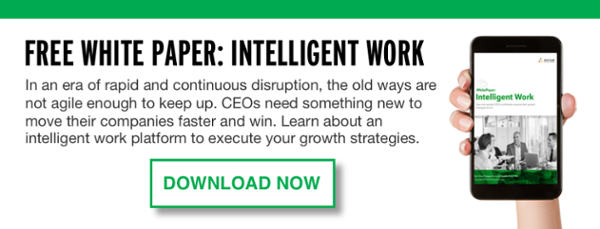At Rhythm Systems, I have had the opportunity to work on several exciting cross-functional projects to help our company move forward. I’ve been part of the team that built our Certification program, part of a team that evaluated, selected and implemented a new CRM, part of the team that’s wrote our best selling business book, Predictable Results, to name just a few. While juggling these growth priorities with my day job can be challenging, these projects typically bear amazing fruit and deepen my relationships with coworkers in other departments. I view them as a way to challenge myself, improve my current skills, and develop in new areas. Based on my own positive experiences with cross-departmental teamwork, I was surprised to read the results of Behnam Tarbrizi’s study in the Harvard Business Review: “75% of Cross-Functional Teams are Dysfunctional.”
our company move forward. I’ve been part of the team that built our Certification program, part of a team that evaluated, selected and implemented a new CRM, part of the team that’s wrote our best selling business book, Predictable Results, to name just a few. While juggling these growth priorities with my day job can be challenging, these projects typically bear amazing fruit and deepen my relationships with coworkers in other departments. I view them as a way to challenge myself, improve my current skills, and develop in new areas. Based on my own positive experiences with cross-departmental teamwork, I was surprised to read the results of Behnam Tarbrizi’s study in the Harvard Business Review: “75% of Cross-Functional Teams are Dysfunctional.”
According to the research, there are some pretty specific conditions to avoid if you want to manage a cross-functional team. Cross-functional collaboration takes a better type of project management to keep the team aligned and focused on its common goal. Your job is to create a team that can get work done, not just pick a group of people suggested to you from human resources.
The goal is bringing people together from different functional areas and that their cross team collaboration can quicken the pace of problem solving to bring innovation to market faster, which will reduce the cycle times help the bottom line. High performers in your company exist in different business units and building successful cross functional teams brings out the best in everyone. Working towards a common goal is one of the major benefits of cross functional team collaboration.
4 Don'ts to Coordinate Cross-Functional Teams
- Lack of systemic approach: The culture of your company has to support this kind of work for it to be successful. Companies that have no clear governance, poor accountability, unspecific goals, and lack of support for cross-functional teams will make it nearly impossible for these teams to succeed. Each project provides its own unique challenges, you need to be flexible enough to come to a solution.
- Departmental Silos that run deep: If you put together a bunch of people from teams that have underlying animosity or believe that they won’t work well together, that becomes a self-fulfilling prophecy. If you have the attitude that engineers and creatives don't work well together, that attitude spills over into the cross-functional team and undermines the project’s success.
- Side projects: Many cross-functional projects fail because the team members see the work as “extra credit” - something to do if they have spare time. If you don’t put the project in your quarterly plan and track it each week with priorities and action items, it won’t happen. Use the detailed plan to coordinate with your team.
- Rigidity: Avoid becoming legalistic about these teams. It’s OK for them to disband after a period of time, or have different team members participate at different times rather than in every meeting. Each project should be frequently evaluated; just like any 3-5 year strategic plan you work on, test your assumptions, make adjustments as needed, and ensure that the project remains aligned with the business goals.

The research (and my own experience) also provide some clear conditions under which cross-functional teams thrive and be accountable (accountability examples).
4 Do's for Cross-Functional Coordination
- Gain support from the executive team: Tarbrizi found that successful cross-functional teams were overseen by high-level cross-functional teams of executives or had a single executive champion. Most cross-functional teams I’ve participated in have had a member of the executive team participate in the team and advocate for its success during company quarterly planning and weekly adjustment meetings. Whenever possible, you should meet face to face, if that isn't possible try to use a video conference so that everyone remains connected.
- One neck to ring: Or, as Tabrizi puts it, “every project should have an end-to-end accountable leader.” Having one person clearly accountable for the success of the project, despite the various contributions and responsibilities of other team members at different points in the project, is key to successfully executing. Pick the right team leader that will have the ability to hold people accountable for their assigned tasks.
- Begin with the end in mind: Before the project even starts, everyone on the team should know the goal, what resources are available, and the deadline. We start most of our cross-functional projects by writing an Objective Statement. We also put the projects in the Rhythm software with an owner, a due date, and clear Red-Yellow-Green success criteria. This eliminates any confusion about what needs to happen by when.
- Include the work in your plan: If you are serious about success, make sure that every aspect of the project and cross-functional work shows up in your plan for the quarter, even if it means that you have to say “no” to some of your team’s other projects to make it happen. If you are an executive, consider including cross-functional work in your team members’ Job Scorecards and performance compensation calculations so it isn’t viewed as something extra but as part of their job.
While it might seem like a lot of work to set up a culture and conditions in which cross-functional teams can thrive, it is well worth the effort. Especially in product development, make sure that you get a cross functional team so that every aspect of the customer experience is considered. As Tabrizi says, when these teams work, “the organization is ultimately more successful.” These teams can "speed innovations to market," and "enable the organization to renew itself.” Using collaboration tools is only part of the solution, you need to create a system that will utilize the unique skill sets of your team members.
Departmental Silos: The Silent Killer (White Paper)
How to Improve Cross Departmental Processes that Impact Multiple Teams
4 Steps to Bust Silos & Encourage Collaboration
Creating Synergy Between Departments and Teams
5 Telltale Signs of Trouble and How to Prevent Departmental Silos
Departmental Silos Can Sneak Up on You: Get Your Teams Aligned
Silos Can Sneak Up On You: Get Your Departments Aligned
Download Free White Paper on How Mid-Market CEOs Confidently Execute Their Growth Strategies & Win
Photo Credit: iStock by Getty Images




